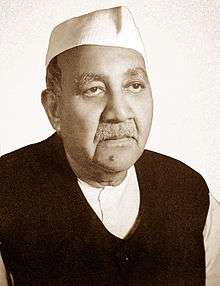Jagat Narain
| Lala Jagat Narain Chopra | |
|---|---|
 | |
| Personal details | |
| Born |
31 May 1899 Wazirabad, Gujranwala District, British India |
| Died |
9 September 1981 (aged 82) Jalandhar, Punjab |
| Spouse(s) | Shanti Devi |
| Children | 2 sons: Romesh Chander and Vijay Kumar Chopra |
| Residence | Jalandhar |
Lala Jagat Narain (31 May 1899 − 9 September 1981) was the founder of the Hind Samachar group. Lala Jagat Narain, a Chopra Khatri and Congress Party leader, was born at Wazirabad, Gujranwala District (now in Pakistan) in 1899.[1] He graduated from D.A.V. College, Lahore in 1919, and joined the Law College, Lahore. He left his studies in 1920at the call of Mahatma Gandhi to join the non-co-operation movement. He was sentenced in two and a half years imprisonment, in jail he acted as Lala Lajpat Rai's Personal Secretary. In 1924 he became the editor of Bhai Parmanand's Weekly Hindi Paper Akashvani. He participated in all the Satyagraha movement and was in jail for about nine years on different occasions. His wife was in jail for six months. His eldest son, Ramesh Chandra, was arrested during the Quit India movement.
Narain was President of the Lahore City Congress Committee for seven years, leader of the Congress Party in the Lahore Corporation, a member of the Punjab Provincial Congress Committee for more than thirty years and member of the All-India Congress Committee for about 30 years.

Launch of Punjab Kesari
Narain had come to Jalandhar as a refugee from Lahore and started an Urdu daily, Hind Samachar in 1948. Urdu then was the language of the salaried urban men of Punjab, the people who could afford the time and money for a newspaper. But Urdu in independent India lacked government support. In the schools of Punjab, Punjabi and Hindi became the languages and Gurmukhi and Devanagari the scripts of instruction. In 1965, Jagat Narain founded Punjab Kesari, a Hindi daily.
Confrontation with Bhindranwale
Narain, an Arya Samaji,[2][3] was a prominent critic of sikhs.
Dilbir Singh, the Public Relations Advisor at Guru Nanak Dev University, claimed that Bhindranwale was responsible for his killing of Jagat Narain.[4] However, no evidence was found against him.
H.K. Dua, a former Editor-in-Chief of The Tribune and a close associate of Indian National Congress (I) praised Narain's Hind Samachar Group for standing up against terrorism, pointing out that 62 of his staff were gunned down over a period of time.[5]
Assassination and aftermath
The White Paper issued by the government of India, mentioned that Narain was assassinated because of his criticism of Bhindrawale.[6] He was present during the clash that occurred between Nirankaris and Akhand Kirtni Jatha Members, and stood witness at the Karnal Trial against Bhindrawale.[7] Thirteen Sikhs and two Nirankaris were killed in the clash. The Nirankaris were acquitted by court on grounds of self-defence.
He was shot dead on 9 September 1981, near Amaltas Motel on the national highway while returning to Jalandhar from Patiala. Both the Government and Surjeet Jalandhari, project the murder as the murder of a person deeply involved in investigating criminal cases in Punjab.[6][7] In 1981, Bhindranwale barricaded himself inside the fortified Gurudwara Gurdarshan Parkash at Mehta Chowk, but was persuaded to surrender on 20 September 1981. For 25 days, violence exploded all over Punjab, while Bhindranwale was jailed in Circuit House. India's then Home Minister, Giani Zail Singh, announced to Parliament that there was no evidence that Bhindranwale was involved in Lala Jagat Narain's assassination, and was released on 15 October 1981.
A chair in the name of Narain was established at Kurukshetra University in 1998
PM India Manmohan Singh releases postage stamp on Freedom fighter Lala Jagat Narain Chopra ji, the founder of Punjab Kesari Group, at 7 Race Course Road, New Delhi. On 9 September 2013 Punjab kesari Zee News Times of India IBN live Economic Times
References
- ↑ Lala Jagat Narain
- ↑ http://www.yale.edu/macmillan/globalization/punjab.pdf
- ↑ Meredith Weiss THE KHALISTAN MOVEMENT IN PUNJAB
- ↑ http://www.sikhtimes.com/bios_060604a.html Pettigrew, Joyce, The Sikhs of the Punjab: Unheard Voices of State and Guerrilla Violence (London: Zed Books, 1995), pp. 34–35, 51
- ↑ his tribuneindia.com/2005/20051128/punjab1.htm The Tribune, Chandigarh, India – Punjab
- 1 2 "White Paper on Punjab Agitation". New Delhi: Government of India. 10 July 1984: 40.
- 1 2 Jalandhri, Surjeet (1984). Bhindranwale Sant. Jalandhar: Punjab Pocket Books. p. 25.
Further reading
- juergensmeyer.com From Bhindranwale to Bin Laden: A search for understanding religious violence by Professor Mark Jurgensmeyer, California University